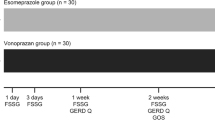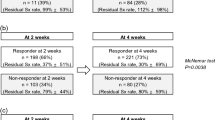Abstract
Background
Evidence suggests that rates of gastroesophageal reflux disease are increasing in the Asia–Pacific region, where patients tend to have predominantly non-erosive reflux disease as opposed to erosive (reflux) esophagitis. At present, data for the responsiveness of non-erosive reflux disease to proton pump inhibition are scant. We aimed to study esomeprazole for the treatment of non-erosive reflux disease in Chinese patients.
Methods
Patients with a clinical diagnosis of gastroesophageal reflux, and a locally validated reflux index, the Chinese GerdQ, of equal to or greater than 12 were recruited and randomized to receive esomeprazole 20 mg daily or placebo for 8 weeks. Reflux index scores, quality of life (SF-36), and the hospital anxiety and depression (HAD) scale and symptom relief were evaluated before, during, and after treatment.
Results
A total of 175 patients were randomized. Patients in the esomeprazole group (n = 85) demonstrated statistically significant reductions in their GerdQ index, from 19.45 to 15.37 and to 14.32 (p = 0.013, p = 0.005) at weeks 4 and 8, respectively. Compared to placebo at week 8, 57.1% of patients on esomeprazole found that their symptoms had resolved or were acceptable compared with 37.2% in the placebo group (p = 0.001). There were no statistically significant differences in overall quality-of-life measures or the HAD scale related to treatment.
Conclusions
This study suggests that esomeprazole is efficacious in treating Chinese patients with non-erosive reflux disease.
Similar content being viewed by others
References
Modlin IM, Hunt RH, Malfertheiner P, et al. Non-erosive reflux disease—defining the entity and delineating the management. Digestion. 2008;78(Suppl 1):1–5.
Armstrong D. A critical assessment of the current status of non-erosive reflux disease. Digestion. 2008;78(Suppl 1):46–54.
Liu XH, Ke MY, Song ZQ, et al. The impact of rabeprazole treatment on the quality of life in patients with reflux esophagitis and non-erosive reflux disease. Zhonghua Nei Ke Za Zhi. 2005;44:818–21.
Fujiwara Y, Higuchi K, Shiba M, et al. Differences in clinical characteristics between patients with endoscopy-negative reflux disease and erosive esophagitis in Japan. Am J Gastroenterol. 2005;100:754–8.
Wu JC. Gastroesophageal reflux disease: an Asian perspective. J Gastroenterol Hepatol. 2008;23:1785–93.
Du J, Liu J, Zhang H, Yu CH, Li YM. Risk factors for gastroesophageal reflux disease, reflux esophagitis and non-erosive reflux disease among Chinese patients undergoing upper gastrointestinal endoscopic examination. World J Gastroenterol. 2007;13:6009–15.
Sperber AD, Halpern Z, Shvartzman P, et al. Prevalence of GERD symptoms in a representative Israeli adult population. J Clin Gastroenterol. 2007;41:457–61.
Cheung TK, Wong BC, Lam SK. Gastro-oesophageal reflux disease in Asia: birth of a ‘new’ disease? Drugs. 2008;68:399–406.
Hu WH, Wong WM, Lam CL, et al. Anxiety but not depression determines health care-seeking behaviour in Chinese patients with dyspepsia and irritable bowel syndrome: a population-based study. Aliment Pharmacol Ther. 2002;16:2081–8.
Donnellan C, Sharma N, Preston C, Moayyedi P. Medical treatments for the maintenance therapy of reflux oesophagitis and endoscopic negative reflux disease. Cochrane Database Syst Rev. 2005;18:CD003245.
van Pinxteren B, Numans ME, Bonis PA, Lau J. Short-term treatment with proton pump inhibitors, H2-receptor antagonists and prokinetics for gastro-oesophageal reflux disease-like symptoms and endoscopy negative reflux disease. Cochrane Database Syst Rev. 2006;3:CD002095.
Fock KM, Teo EK, Ang TL, Chua TS, Ng TM, Tan YL. Rabeprazole vs esomeprazole in non-erosive gastro-esophageal reflux disease: a randomized, double-blind study in urban Asia. World J Gastroenterol. 2005;11:3091–8.
Fass R, Chey WD, Zakko SF, et al. Clinical trial: the effects of the proton pump inhibitor dexlansoprazole MR on daytime and nighttime heartburn in patients with non-erosive reflux disease. Aliment Pharmacol Ther. 2009;29:1261–72.
Wong WM, Lam KF, Lai KC, et al. A validated symptoms questionnaire (Chinese GERDQ) for the diagnosis of gastro-oesophageal reflux disease in the Chinese population. Aliment Pharmacol Ther. 2003;17:1407–13.
Lind T, Havelund T, Carlsson R, et al. Heartburn without oesophagitis: efficacy of omeprazole therapy and features determining therapeutic response. Scand J Gastroenterol. 1997;32:974–9.
Carlsson R, Dent J, Watts R, et al. Gastro-oesophageal reflux disease in primary care: an international study of different treatment strategies with omeprazole. International GORD Study Group. Eur J Gastroenterol Hepatol. 1998;10:119–24.
Miner P Jr, Orr W, Filippone J, Jokubaitis L, Sloan S. Rabeprazole in nonerosive gastroesophageal reflux disease: a randomized placebo-controlled trial. Am J Gastroenterol. 2002;97:1332–9.
Kinoshita Y, Ashida K, Hongo M. Randomised clinical trial: a multicentre, double-blind, placebo-controlled study on the efficacy and safety of rabeprazole 5 mg or 10 mg once daily in patients with non-erosive reflux disease. Aliment Pharmacol Ther. 1111;33:213–24.
Uemura N, Inokuchi H, Serizawa H, et al. Efficacy and safety of omeprazole in Japanese patients with nonerosive reflux disease. J Gastroenterol. 2008;43:670–8.
Lim PW, Goh KL, Wong BC. CYP2C19 genotype and the PPIs—focus on rabeprazole. J Gastroenterol Hepatol. 2005;20(Suppl):S22–8.
Leontiadis GI, Sharma VK, Howden CW. Systematic review and meta-analysis: enhanced efficacy of proton-pump inhibitor therapy for peptic ulcer bleeding in Asia—a post hoc analysis from the Cochrane Collaboration. Aliment Pharmacol Ther. 2005;21:1055–61.
Xiao YL, Lin JK, Cheung TK, et al. Reflux profile of Chinese gastroesophageal reflux disease patients with combined multichannel intraluminal impedance-pH monitoring. J Gastroenterol Hepatol. 2009;24:1113–8.
Wong WM, Lam KF, Cheng C, et al. Population based study of noncardiac chest pain in southern Chinese: prevalence, psychosocial factors and health care utilization. World J Gastroenterol. 2004;10:707–12.
Ang TL, Fock KM, Ng TM, Teo EK, Chua TS, Tan J. A comparison of the clinical, demographic and psychiatric profiles among patients with erosive and non-erosive reflux disease in a multi-ethnic Asian country. World J Gastroenterol. 2005;11:3558–61.
Fass R, Naliboff B, Higa L, et al. Differential effect of long-term esophageal acid exposure on mechanosensitivity and chemosensitivity in humans. Gastroenterology. 1998;115:1363–73.
Wu JC, Cheung CM, Wong VW, Sung JJ. Distinct clinical characteristics between patients with nonerosive reflux disease and those with reflux esophagitis. Clin Gastroenterol Hepatol. 2007;5:690–5.
Hong SJ, Ko BM, Jung IS, et al. Relevance of ineffective esophageal motility and hyperactive acid sensitization in patients with gastroesophageal reflux. J Gastroenterol Hepatol. 2007;22:1662–5.
Quigley EM, Hungin AP. Review article: quality-of-life issues in gastro-esophageal reflux disease. Aliment Pharmacol Ther. 2005;22(Suppl 1):41–7.
Chan Y, Ching JY, Cheung CM, et al. Development and validation of a disease-specific quality of life questionnaire for gastro-oesophageal reflux disease: the GERD-QOL questionnaire. Aliment Pharmacol Ther. 2009;31:452–60.
Cheung TK, Wong WM, Wong NY, et al. Symptom resolution does not predict healing of erosive oesophagitis in Chinese. Digestion. 2007;75:128–34.
Fenter TC, Naslund MJ, Shah MB, Eaddy MT, Black L. The cost of treating the 10 most prevalent diseases in men 50 years of age or older. Am J Manag Care. 2006;12:S90–8.
Bardhan KD, Royston C, Nayyar AK. Reflux rising! An essay on witnessing a disease in evolution. Dig Liver Dis. 2006;38:163–8.
Acknowledgments
We thank AstraZeneca Hong Kong for the supply of the study medicine and the identical placebo tablets. The study was supported by the Simon KY Lee Endowment Professorship, and the outstanding researcher award 2005–2006 of the University of Hong Kong.
Author information
Authors and Affiliations
Corresponding author
Rights and permissions
About this article
Cite this article
Tan, V.P.Y., Wong, W.M., Cheung, T.K. et al. Treatment of non-erosive reflux disease with a proton pump inhibitor in Chinese patients: a randomized controlled trial. J Gastroenterol 46, 906–912 (2011). https://doi.org/10.1007/s00535-011-0402-1
Received:
Accepted:
Published:
Issue Date:
DOI: https://doi.org/10.1007/s00535-011-0402-1




